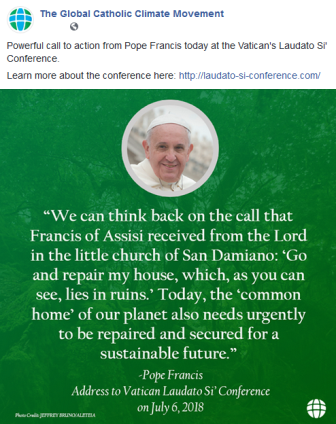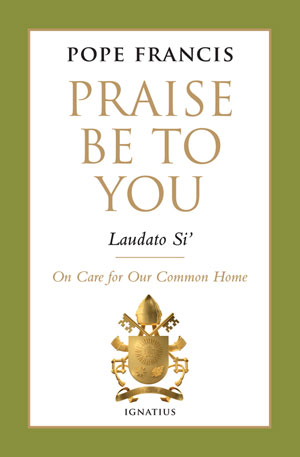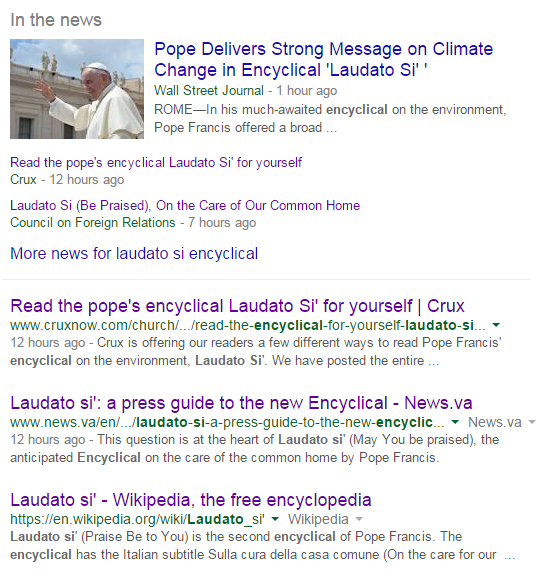Laudato Si
Laudato Si'
Digging Into Laudato Si'
by Samantha Panchèvre and Robert McKim / NCR
When it comes to intergenerational solidarity, Pope Francis asks us to consider, "What kind of world do we want to leave to those who come after us, to children who are now growing up?"
You would think it’s common sense to prioritize the health of the planet we all rely on, since there are no jobs on a dead planet, but that idea doesn't hold weight for those who prefer short-term gain over long-term sustainability.
The Precautionary Principle (video)
················································
The Catholic Faith and Its First Environmental Encyclical
Nearly three years after the publication of Laudato Si’, Pope Francis’ encyclical letter on the care for our common home, the Pontiff’s prophetic words continue to ring:
- “What kind of world do we want to leave to those who come after us, to children who are now growing up?”
- July 5 - 6, 2018
The inspiration to care for our common home ultimately springs from our faith that the natural world is God’s creation entrusted to our care.
- The ultimate challenge of Laudato Si' is to act... to inspire a “massive movement” for the care of our imperiled common planetary home. The Conference... brings together representatives of the civil society, religions, churches, scientists, politicians, economists, grassroots movements, et al., in short “all people of good will”, to dialogue and act together.
News from the Laudato Si' conference (2018)
(Via United Press International/UPI) "The pace of consumption, waste and environmental change has so stretched the planet's capacity that our contemporary lifestyle, unsustainable as it is, can only precipitate catastrophes," Pope Francis said Friday. "There is a real danger that we will leave future generations only rubble, deserts and refuse."
The pope referred to this year's COP24 environmental summit, set for Poland in December, saying discussions there could be significant for the path set out by the 2015 Paris agreement, which set stringent standards to restrict carbon emissions and other greenhouse gases.
"We all know that much still needs to be done to implement that agreement. All governments should strive to honor the commitments made in Paris, in order to avoid the worst consequences of the climate crisis," the pope said. "Reducing greenhouse gases requires honesty, courage and responsibility, above all on the part of those countries which are more powerful and pollute the most.
"We cannot afford to waste time."
Pope Francis said the world now has too many special interests, and economic interests can easily trump the common good.
"Human beings, while capable of the worst, are also capable of rising above themselves, choosing again what is good, and making a new start. Please continue to work for the radical change which present circumstances require," he said.
In closing, the pontiff looked to Saint Francis of Assisi, the patron saint for the environment, for inspiration.
"May our struggles and our concern for this planet never take away the joy of our hope."
················································
The First 'Eco-Encyclical'
The First Catholic Pontiff to be named after Saint Francis of Assisi, the Patron Saint of the Environment, Commits the Catholic Faith to Environmental Activism
An Eco-Encyclical for the Ages
"It should always be kept in mind that 'environmental protection cannot be assured solely on the basis of financial calculations of costs and benefits. The environment is one of those goods that cannot be adequately safeguarded or promoted by market forces'. Once more, we need to reject a magical conception of the market, which would suggest that problems can be solved simply by an increase in the profits of companies or individuals. Is it realistic to hope that those who are obsessed with maximizing profits will stop to reflect on the environmental damage which they will leave behind for future generations?" (190).
"As long as production is increased, little concern is given to whether it is at the cost of future resources or the health of the environment; as long as the clearing of a forest increases production, no one calculates the losses entailed in the desertification of the land, the harm done to biodiversity or the increased pollution. In a word, businesses profit by calculating and paying only a fraction of the costs involved" (195).
Laudato Si': Chapter 5, sections 4 and 5
~
- Anthropocene
- Biodiversity
- Climate Change
- Climate Policy
- Creation Spirituality
- Earth360
- Eco-nomics
- Eco-Spirituality
- Eco-Theology
- Ecology Studies
- Environmental Protection
- Environmental Security
- Extinction
- Green Best Practices
- Green Values
- Microorganism
- Natural Resources
- Natural Rights
- Nature
- Planet Citizen
- Resilience
- Strategic Demands
- Sustainability
- Whole Earth
- Youth



